The Parliamentary Secretary for Financial Services, Digital Economy and Innovation Silvio Schembri launched Malta.ai, the Maltese Government’s vision on Artificial Intelligence.
Malta.ai to collaborate with SingularityNET, the company behind Sophia’s AI, on a pilot project to explore a citizenship test for robots in the process of drafting new regulation for AI.
Parliamentary Secretary Silvio Schembri also announced a task force entrusted to design a national strategy on AI with the aim of placing Malta amongst the top 10 nations in the world in AI.
“After successfully positioning Malta as The Blockchain Island by being the first in the world to regulate DLT products and services, we now would like to position Malta amongst the top 10 countries in the world with an Artificial Intelligence Policy”, said Schembri.

In the presence of Sophia, the AI Robot, Silvio Schembri explained that Malta will develop a National Artificial Intelligence Strategy cognizant of other strategies being pursued on DLT and IoT.
“In the process, we have invited SingularityNET and the team behind Sophia’s AI to contribute to Malta.ai entrusted with the AI Strategy. Amongst others, with SingularityNET, we will explore a pilot project to create a citizenship test for robots in the process of drafting new regulation for AI. Through Malta.ai, we would like to invite other firms who wish to contribute and be part of our journey in AI. This is the start of another chapter in Malta’s vision to become a technological hub. We look forward to work hand in hand with all stakeholders including European institutions on artificial intelligence”, said Schembri.
Dr Ben Goertzel, CEO at SingularityNET said “We are extremely excited to be a part of the government of Malta’s creation of an AI-focused task force and the world first citizenship test for robots. The creation of the task force itself shows the government’s recognition of AI’s tremendous potential – and the reality that it must be balanced with risk, policy and ethical considerations. The task force’s creation is just the very beginning, too. I’m confident the impressive mix of academics, entrepreneurs and experts being pulled together for the task force will put Malta in a leading position, creating an industry and applications better than many of us can imagine.
The head of the AI task force, Wayne Grixti, said one still needs to see how this concept would work, adding that granting citizenship for robots in Malta will also grant them access to the European Union.
Grixti said the idea came after Sophia, who was present for the launch, was given citizenship in Saudi Arabia.
Ben Goertzel the founder and CEO of Singularity NET and chief scientist behind Sophia, said: “If we craft a scientifically grounded approach to AI and Robot citizenship, we can create a robot citizenship test where you evaluate whether an AI robot understands the basic laws and the constitution of a country and can draw inferences about real situations which you would expect a an intelligent human being to be able to draw about the laws of that country.
If an AI robot can demonstrate practical situation understanding rights and responsibilities of being a citizen, then in my view that robot should be a citizen just as much as a person. Just like computers were a small niche in the 70s and then exploded and are now found everywhere in the economy – the same is going to happen with Blockchain and AI. It’s already happening. In five to ten years every human pursuit is going to be infused with AI and Blockchain, every home is going to have a robot like Sofia, and Malta, due to the vision of these gentlemen can have a key role in how this can happen.”
The Malta.ai taskforce will be chaired by Mr Wayne Grixti. Its members include Dr Angelo Dalli, Ing. Antoine Sciberras, Prof Alexei Dingli, Dr Jackie Mallia, Dr Godfrey Vella, Dr Dylan Seychell, Dr Abdalla Kablan, Ing. Emanuel Darmanin, Mr Francois Piccione, and Wilbert Tabone as secretary.
The Maltese Government is looking at AI as a means to improve the health and well-being of our citizens, to make government services more accessible, to provide information that is more relevant to the public, relieve employees from simple or repetitive tasks, and allow them to focus on more complex high value-added activities. It will also address data backlogs with cognitive technologies which can also perform end-to-end processes on a massive scale while leaving the harder for human experts.
About Artificial Intelligence
Artificial Intelligence (AI) or machine learning is a rapidly evolving technology that harnesses the ability of machines to learn and perform cognitive functions, similar to that of the human brain. AI is derived from the applied extraction of knowledge or insights from data allowing machines to make informed decisions. Artificial Intelligence is not only robots. It is the processing of data that can be used for machine learning, computer vision, natural language processing and predictive modeling. To achieve this we need more advances in computers, chip design and Quantum Computing. AI solves large problems with automation in public and private sectors.
Many AI algorithms are capable of learning from data; they can enhance themselves by learning new heuristics (strategies, or “rules of thumb”, that have worked well in the past), or can themselves write other algorithms. Some of the “learners” described below, including Bayesian networks, decision trees, and nearest-neighbor, could theoretically, if given infinite data, time, and memory, learn to approximate any function, including whatever combination of mathematical functions would best describe the entire world. These learners could therefore, in theory, derive all possible knowledge, by considering every possible hypothesis and matching it against the data.
AI is expected to hit $15.7 trillion of global economic growth by 2030. It is expected to impact every economic sector and transform current jobs and create new ones. It is estimated that over 2000 companies globally working in this sector raise over $36.7 billion. It will diversify broad sectors in IT and Engineering resulting in the creation of new jobs of the future.
AI has the potential of growing compoundly at a rate of 75% until the year 2021.
About Sophia – The Robot
Sophia is a social humanoid robot developed by Hong Kong-based company Hanson Robotics. Sophia was activated on February 14, 2016 and made her first public appearance at South by Southwest Festival (SXSW) in mid-March 2016 in Austin, Texas, United States. Robot Sophia is able to display more than 50 facial expressions.
On October 25, at the Future Investment Summit in Riyadh, the robot was granted Saudi Arabian citizenship, becoming the first robot ever to have a real citizenship, sparking a new age of citizenship to robots (ius robot).

Sophia uses artificial intelligence, visual data processing and facial recognition. Sophia also imitates human gestures and facial expressions and is able to answer certain questions and to make simple conversations on predefined topics (e.g. on the weather).
Sophia uses voice recognition (speech-to-text) technology from Alphabet Inc. (parent company of Google) and is designed to get smarter over time. Sophia’s intelligence software is designed by Hanson Robotics. The AI program analyses conversations and extracts data that allows her to improve responses in the future.
Hanson designed Sophia to be a suitable companion for the elderly at nursing homes, or to help crowds at large events or parks. He has said that he hopes that the robot can ultimately interact with other humans sufficiently to gain social skills
About Malta.ai
Malta is in a position to explore Artificial Intelligence as a new economic niche with a vision is to replicate what we have done in the Blockchain sector and transform the potential of Artificial Intelligence into a new contributor to Malta’s economic growth in digital innovation.
The Government’s aim is to develop a National AI Strategy and put Malta amongst the top 10 nations with a national strategy for Artificial Intelligence. Our objectives include having discussions on this subject with stakeholders to build awareness of the key topics and issues that will form a national AI Framework. We want to consult on a policy that considers for ethically aligned, transparent and socially responsible AI, identify policy, regulatory and fiscal measures to strengthen Malta’s appeal as a hub for foreign investment in this sector, while identifying the underlying skill base and infrastructure needed to support AI.
The strategy will eventually develop cutting edge use-cases of how AI could be deployed in Malta as a central part of this policy and understand how AI can be applied by Government to further improve the services given to citizens.
For this purpose, we have established a task force on AI made up of entrepreneurs, academics and experts in the field. The taskforce shall devise a holistic approach on the sector, involving accademia, start-ups and companies, to find ways how to create a sustainable local engine for growth, look into the unknown risks of AI without hindering innovation and economic development, and create a new sector for investment on our shores.
We look forward to start another exciting chapter in Malta’s digital innovation economy, working hand in hand with International partners, European institutions and other stakeholders who wish to develop and harness the potential of Artificial Intelligence.
For more information at https://malta.ai/
Credit/Source: Malta Independent





